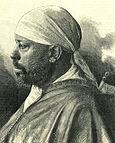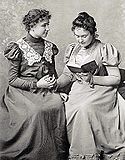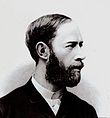- 1887
-
This article is about the year 1887.
Millennium: 2nd millennium Centuries: 18th century – 19th century – 20th century Decades: 1850s 1860s 1870s – 1880s – 1890s 1900s 1910s Years: 1884 1885 1886 – 1887 – 1888 1889 1890 1887 in topic: Humanities Archaeology – Architecture – Art – Literature – Music By country Australia – Canada – France – Germany – Mexico – South Africa – US – UK Other topics Rail Transport – Science – Sports Lists of leaders Colonial Governors – State leaders Birth and death categories Births – Deaths Establishments and disestablishments categories Establishments – Disestablishments Works category Works 1887
MDCCCLXXXVIIAb urbe condita 2640 Armenian calendar 1336
ԹՎ ՌՅԼԶAssyrian calendar 6637 Bahá'í calendar 43 – 44 Bengali calendar 1294 Berber calendar 2837 British Regnal year 50 Vict. 1 – 51 Vict. 1 Buddhist calendar 2431 Burmese calendar 1249 Byzantine calendar 7395 – 7396 Chinese calendar 丙戌年十二月初八日
(4523/4583-12-8)— to —丁亥年十一月十七日
(4524/4584-11-17)Coptic calendar 1603 – 1604 Ethiopian calendar 1879 – 1880 Hebrew calendar 5647 – 5648 Hindu calendars - Bikram Samwat 1943 – 1944 - Shaka Samvat 1809 – 1810 - Kali Yuga 4988 – 4989 Holocene calendar 11887 Iranian calendar 1265 – 1266 Islamic calendar 1304 – 1305 Japanese calendar Meiji 20
(明治20年)Korean calendar 4220 Minguo calendar 25 before ROC
民前25年Thai solar calendar 2430
Year 1887 (MDCCCLXXXVII) was a common year starting on Saturday (link will display the full calendar) of the Gregorian calendar and a common year starting on Thursday of the 12-day slower Julian calendar.Events
January–March
- January 11 – Louis Pasteur's anti-rabies treatment is defended in the French Academy of Medicine by Dr. Joseph Grancher.
- January 20 – The United States Senate allows the Navy to lease Pearl Harbor as a naval base.
- January 21
- The Amateur Athletic Union (AAU) is formed.
- Brisbane receives a daily rainfall of 465 millimetres – a record for any Australian capital city.
- January 24 – Battle of Dogali: Abyssinian troops defeat the Italians.
- January 28 – In a snowstorm at Fort Keogh, Montana, USA, the largest snowflakes on record are reported. They are 15 inches (38 cm) wide and 8 inches (20 cm) thick.
- January 28 – Construction of the foundations of the Eiffel Tower starts in Paris, France.
- February 2 – In Punxsutawney, Pennsylvania, the first Groundhog Day is observed.
- February 5 – The Giuseppe Verdi opera Otello premieres at La Scala.
- February 8 – The Dawes Act, or the General Allotment Act, is enacted.
- February 23 – The French Riviera is hit by a large earthquake, killing around 2,000 along the coast of the Mediterranean Sea.
- February 26 – At the Sydney Cricket Ground, George Lohmann becomes the first bowler to take eight wickets in a Test innings.
- March 3 – Anne Sullivan begins teaching Helen Keller.
- March 4 – Gottlieb Daimler unveils his first automobile.
- March 7 – North Carolina State University is established as North Carolina College of Agriculture and Mechanic Arts.
- March 13 – Chester Greenwood patents earmuffs.
- March 19 – Henry Cogswell College is established by Henry D. Cogswell.
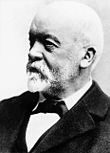 March 4: Daimler
March 4: Daimler
April–June
- April 1 – Mumbai Fire Brigade is established.
- April 4 – Argonia, Kansas elects Susanna M. Salter as the first female mayor in the United States.
- April 10 – The Catholic University of America is founded on Easter Sunday.
- April 21 – Schnaebele incident – French/German border incident nearly leads to war between the two countries.
- April 20 – Occidental College is founded.
- May 3 – An earthquake hits Sonora, Mexico.
- May 9 – Buffalo Bill's Wild West Show opens in London.
- May 14 – The cornerstone of the new Stanford University, in northern California, is laid (the college opens in 1891).
- June 8 – Herman Hollerith receives a patent for his punched card calculator.
- June 18 – The Reinsurance Treaty is closed between Germany and Russia.
- June 21 – The British Empire celebrates Queen Victoria's Golden Jubilee, marking the 50th year of her reign.[1]
- June 23 – The Rocky Mountains Park Act becomes law in Canada, creating that nation's first national park, Banff National Park.[2]
- June 28 – Minot, North Dakota is incorporated as a city.
 June 23: Banff National Park.
June 23: Banff National Park.
July–September
- July 1 – Construction of the metal structure of the Eiffel Tower starts in Paris, France
- July 9 – Frances Gordy murdered by Jonathon White[disambiguation needed
 ] in Auburn, AL in the antebellum home located in 1133 East University Drive.
] in Auburn, AL in the antebellum home located in 1133 East University Drive. - July 12 – Odense Boldklub, the Danish football team, is founded as the Odense Cricket Club.
- July 26 – L. L. Zamenhof publishes "Dr. Esperanto's International Tongue".
- August – The U.S. National Institutes of Health is founded at the Marine Hospital, Staten Island, NY, as the Laboratory of Hygiene.
- August 13 – The Hibernian F.C. defeats Preston North End to win the "Championship of the World" after the two teams win the Association football Cup competitions in their respective countries.
- September 5 – The Theatre Royal, Exeter, England burns down, killing 186 people.
- September 28 – Start of the 1887 Yellow River flood in China, killing 900,000 to 2,000,000 people.
October–December
- October 1 – The British Empire takes over Balochistan.
- October 3 – Florida A&M University opens its doors in Tallahassee, Florida.
- November
- Results of the Michelson-Morley experiment are published, indicating that the speed of light is independent of motion.
- Arthur Conan Doyle's detective character Sherlock Holmes makes his first appearance, in the novel A Study in Scarlet published in Beeton's Christmas Annual.
- November 3 – The Associação Académica de Coimbra, the students' union of the University of Coimbra in Portugal, is founded.
- November 8 – Emile Berliner is granted a patent for his Gramophone.
- November 10 – Louis Lingg, sentenced to be hanged for his alleged role in the Haymarket Riot bomb, kills himself by dynamite.
- November 11 – August Spies, Albert Parsons, Adolph Fischer, George Engel, Michael Schwab, and Samuel Fielden are hanged for inciting riot and murder in the Haymarket Riot of May 4, 1886.
- November 13 – Bloody Sunday: Police clash with pro-Irish independence protesters.
- December 5 – International Bureau of Intellectual Property.
- December 25 – Glenfiddich single malt Scotch whisky is first produced.
Date unknown
- Franz König publishes "Über freie Körper in den Gelenken" in the medical journal Deutsche Zeitschrift für Chirurgie, describing (and naming) the disease Osteochondritis dissecans for the first time.
- Teachers College, later part of Columbia University, is founded.
- Thomas Stevens is the first man to bicycle around the world.
- The New Gate is built in Jerusalem.
- The comptometer is patented by Dorr Eugene Felt.
- The first All-Ireland Hurling and Football Finals are held.
- Japan annexes Iwo Jima.
- Zululand becomes a British colony.
- Construction of Spandau Prison in Berlin is completed.
- Heinrich Hertz discovers the photoelectric effect on the production and reception of electromagnetic (EM) waves (radio). This was an important step towards the understanding of the quantum nature of light.
- The U.S. Congress passes the Interstate Commerce Act.
- Adolf Gaston Eugen Fick invents the contact lens, made of a type of brown glass.
- A. G. Edwards, Inc., is founded by General Albert Gallatin Edwards.
- Heyl & Patterson Inc., a pioneer in coal unloading equipment, is founded by Edmund W. Heyl and William J. Patterson.
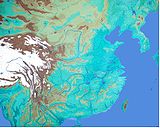 Yellow River flood kills 900,000 people living along its banks.
Yellow River flood kills 900,000 people living along its banks.
- Laos and Cambodia are added to French Indochina.
- Antonio Guzmán Blanco ends his term as President of Venezuela.
- Publication in Barcelona of Enrique Gaspar's El anacronópete, the first work of fiction to feature a time machine.[3]
- Publication begins of Futabatei Shimei's Ukigumo, the first modern novel in Japan.
Births
January–June
- January 1 – Wilhelm Canaris, head of German military intelligence in World War II (d. 1945)
- January 3 – August Macke, German painter (d. 1914)
- January 10 – Robinson Jeffers, American poet (d. 1962)
- January 13 – Jorge Chavez, pioneer Peruvian aviator (d. 1910)
- January 17 – Ola Raknes, Norwegian psychoanalyst and philologist (d. 1975)
- January 19 – Alexander Woollcott, American intellectual (d. 1943)
- January 21 – Maude Davis, oldest person in the World (d. 2002)
- January 22 – Helen Hoyt, American poet (d. 1972)
- January 23 – Dorothy Payne Whitney, American-born philanthropist and social activist (d. 1968)
- January 28 – Arthur Rubinstein, Polish-born pianist and conductor (d. 1982)
- February 1 – Charles Nordhoff, English-born author (d. 1947)
- February 2 – Pat Sullivan, Australian director and producer of animated films (d. 1933)
- February 3 – Georg Trakl, Austrian poet (d. 1914)
- February 4 – Sheila Kaye-Smith, English writer (d. 1955)
- February 6 – Josef Frings, Archbishop of Cologne (d. 1978)
- February 10 – John Franklin Enders, American scientist, recipient of the Nobel Prize in Physiology or Medicine (d. 1985)
- February 11
- Ernst Hanfstängl, German-born pianist and U.S. politician (d. 1975)
- John van Melle, Dutch-born writer (d. 1953)
- February 17 – Leevi Madetoja, Finnish composer (d. 1947)
- February 20 – Vincent Massey, Governor-General of Canada (d. 1967)
- February 26
- Grover Cleveland Alexander, baseball player (d. 1950)
- William Frawley, American actor (d. 1966)
- March 3 – Lincoln Beachey, American stunt pilot (d. 1915)
- March 4 – Violet MacMillan, American Broadway theatre actress (d. 1953)
- March 5 – Heitor Villa-Lobos, Brazilian composer (d. 1959)
- March 9 – Phil Mead, English cricketer (d. 1958)
- March 14 – Sylvia Beach, American publisher in Paris (d. 1952)
- March 14 – Charles Reisner, American silent actor and film director (d. 1962)
- March 22 – Chico Marx, American comedian and actor (d. 1961)
- March 23
- March 24 – Fatty Arbuckle, American actor (d. 1933)
- April 10 – Bernardo Houssay, Argentine physiologist, Nobel Prize laureate (d. 1971)
- April 15 – Mike Brady, American golfer (d. 1972)
- May 2 – Eddie Collins, baseball player (d. 1951)
- May 5 – Geoffrey Fisher, Archbishop of Canterbury (d. 1972)
- May 10 – Mir Ghotbeddin Mohammad Angha, 40th master of the Oveyssi Sufi Order (d. 1962)
- May 11 – Paul Wittgenstein, Austrian-born pianist (d. 1951)
- May 25 – Pio of Pietrelcina, Italian saint (d. 1968)
- May 26 – Paul Lukas, Hungarian-born actor (d. 1971)
- May 31 – Saint-John Perse, French diplomat and writer, Nobel Prize laureate (d. 1975)
- June 2 – Orrick Johns, American poet and playwright (d. 1946)
- June 22 – Julian Huxley, British biologist (d. 1975)
- June 25 – George Abbott, American playwright (d. 1995)
July–December
- July 7 – Marc Chagall, Russian-born painter (d. 1985)
- July 16 – Shoeless Joe Jackson, baseball player (d. 1951)
- July 18 – Vidkun Quisling, Norwegian politician and traitor (d. 1945)
- July 22 – Gustav Hertz, German physicist, Nobel Prize laureate (d. 1975)
- July 28 – Marcel Duchamp, French-born artist (d. 1968)
- July 29 – Sigmund Romberg, Hungarian-born composer (d. 1951)
- August 3 – Rupert Brooke, British war poet (d. 1915)
- August 12 – Erwin Schrödinger, Austrian physicist, Nobel Prize laureate (d. 1961)
- August 13 – Julius Freed, American inventor and banker (d. 1952)
- August 15 – Edna Ferber, American novelist (d. 1968)other sources give year of her birth as 1885
- August 17
- Emperor Karl I of Austria (d. 1922)
- Marcus Garvey, American publisher, entrepreneur, and Pan Africanist (d. 1940)
- August 24 – Harry Hooper, baseball player (d. 1974)
- August 28 – István Kühár, Slovene (Prekmurian) writer and politician (d. 1922)
- September 1 – Blaise Cendrars, Swiss writer (d. 1961)
- September 3 – Frank Christian, American jazz musician (d. 1973)
- September 12 – Yusif Vazir Chamanzaminli, Azerbaijani statesman and writer, core author of novel Ali and Nino, [d. 1943, in GULAG].
- September 13 – Lavoslav Ružička, Croatian chemist, Nobel Prize laureate (d. 1976)
- September 16
- Nadia Boulanger, French composer and composition teacher (d. 1979)
- Kamato Hongo, the last verified living person born in 1887 (d. 2003)
- September 26 – Edwin Keppel Bennett, British writer (d. 1958)
- September 28 – Avery Brundage, American sports official (d. 1975)
- October 1 – Violet Jessop, RMS Titanic survivor (d. 1971)
- October 5 – René Cassin, French judge, recipient of the Nobel Peace Prize (d. 1976)
- October 6 – Le Corbusier, Swiss architect (d. 1965)
- October 8 – Huntley Gordon, Canadian-born actor (d. 1956)
- October 22 – John Reed, American journalist (d. 1920)
- October 31 – Chiang Kai-shek, 1st ~ 5th President of the Republic of China (d. 1975)
- November 1 – L. S. Lowry, English painter (d.1976)
- November 6 – Walter Johnson, baseball player (d. 1946)
- November 10 – Arnold Zweig, German writer (d. 1968)
- November 15 – Georgia O'Keeffe, American Woman Painter (d.1986)
- November 17 – Bernard Montgomery, World War II British commander (d. 1976)
- November 19 – James B. Sumner, American chemist, Nobel Prize laureate (d. 1955)
- November 23 – Boris Karloff, English actor (d. 1969)
- November 28 – Jacobo Palm, Curaçao born composer (d. 1982)
- December 12 – Kurt Atterberg, Swedish composer (d. 1974)
- December 13 – Alvin Cullum York, American war hero during World War I (d. 1964)
- December 22 – Srinivasa Aaiyangar Ramanujan, Indian mathematician (d. 1920)
- December 25 – Conrad Hilton, American hotelier (d.1979)
Deaths
January–June
- February 19 – Eduard Douwes Dekker, Dutch writer (b. 1820)
- February 26 – Anandi Gopal Joshi, first Indian woman doctor (b. 1865)
- February 27 – Alexander Borodin, Russian composer (b. 1833)
- March 8 – Henry Ward Beecher, American clergyman and reformer (b. 1813)
- March 24 – Ivan Kramskoi, painter (b. 1837)
- March 28 – Ditlev Gothard Monrad, Danish politician (b. 1811)
- April 23 – John Ceiriog Hughes, Welsh poet (b. 1832)
- May 7 – CFW Walther, German-American theologian (b. 1811)
- May 8 – Aleksandr Ulyanov, Russian revolutionary, brother of V. I. Lenin (b. 1866)
- May 14 – Lysander Spooner, American philosopher and abolitionist (b. 1808)
- June 4 – William A. Wheeler, Vice President of the United States, (b. 1819)
- June 10 – Richard Lindon, Inventor of the rugby ball, the India-rubber inflatable bladder and the brass hand pump for the same (b. 1816)
July–December
- July 8 – John Wright Oakes, landscape painter (b. 1820)
- July 17 – Dorothea Dix, American social activist (b. 1802)
- July 25 – John Taylor, American religious leader (b. 1808)
- August 8 – Alexander William Doniphan, American lawyer and soldier (b. 1808)
- August 19 – Alvan Clark, telescope manufacturer (b. 1804)
- August 20 – Jules Laforgue, French poet (b. 1860)
- October 17 – Gustav Kirchhoff, German physicist (b. 1824)
- October 21 – Bernard Jauréguiberry, admiral (b. 1815)
- November 2 – Jenny Lind, Swedish soprano (b. 1820)
- November 8 – Doc Holliday, American gambler and gunfighter (b. 1851)
- November 19 – Emma Lazarus, American poet (b. 1859)
- November 28 – Gustav Fechner, experimental psychologist (b. 1801)
- December 28 – Ali Raza[disambiguation needed
 ], Proude of Pakistan (b. 1804)
], Proude of Pakistan (b. 1804)
References
- ^ Royal.gov.uk
- ^ pc.gc.ca
- ^ Westcott, Kathryn (2011-04-09). "HG Wells or Enrique Gaspar: Whose time machine was first?". BBC News. http://www.bbc.co.uk/news/mobile/world-europe-12900390. Retrieved 2011-04-09.
Categories:
Wikimedia Foundation. 2010.

